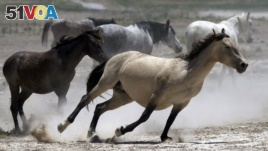08 August 2021
U.S. land managers have begun efforts to capture about 50 percent more wild horses than originally planned this year because of severe drought across the U.S. West. That means they will capture about 6,000 additional animals, mostly in the western states of Nevada, Oregon and Colorado.
The Bureau of Land Management, or BLM, said the emergency roundups, or mass capture, began Sunday in Oregon and Monday in Nevada. The BLM actions are centered on places where long-term overpopulation of the herds "already has stretched the available food and water to its limits."
Nada Wolff Culver is the bureau's deputy director for policy and programs. She said, "As one of the agencies charged with the responsibility to protect and manage America's wild horses and burros, the BLM is prepared to take emergency action where we can in order to save the lives of these cherished animals."
In announcing the effort Monday, Culver said the agency goal is "continuing our efforts to reduce overpopulation across the West." That means having healthy herd sizes that can live through severe conditions like long periods of drought. She noted that droughts "are becoming more frequent due to climate change."

Wild horses kick up dust as they run at a watering hole outside Salt Lake City, Utah.
Those who advocate for the wild horses say that the BLM action comes from pressure from cattle ranchers, who want to keep the food and water for their livestock. Horses compete with cattle for the same plants and watering places.
"Blame the horse"
Laura Leigh is president of the nonprofit group Wild Horse Education. She said she is unhappy that the Biden administration is continuing the policies of former President Donald Trump and previous administrations. They removed the protected horses, but did not limit the number of cattle and sheep grazing on the same land. Leigh does not believe the administration's claim to care about the environment and wild animals. While ranchers are harming the land, "we blame the horse," she said.
Kaitlynn Glover is executive director of resources for the National Cattlemen's Beef Association. She said ranchers have already made voluntary changes to reduce their use of federal lands for feeding their cattle. She noted that the current drought is more severe than in recent years.
Culver said in an email to The Associated Press that the removal of the horses is important to the health of both the horses and the land.
"Even in times where resources are plentiful, these overpopulated herds cause serious damage to the landscape," she wrote.
More than the environment can support
The bureau says the estimated 86,000 free-roaming horses and burros on federal lands is three times larger than what the environment can support. Animal advocates disagree.
About 1,400 of the captured animals may be returned to the wild after they receive birth control drugs.
Culver noted that the BLM announced last week that it was taking steps to make certain that any horses taken in by individuals are treated well. In the past, some were sold to be killed for their meat.
Horse advocates welcomed efforts to more strictly control the process, but said the reforms don't go far enough. They fear that horses will still end up being killed as long as the government offers $1,000 cash to people who take the animals.
U.S. Representative Dina Titus is a Nevada Democrat. She said the problems with wild horses show poor management by BLM. She added that she "led an effort to provide funding... for safe and humane birth control."
I'm Jill Robbins.
Scott Sonner reported on this story for the Associated Press. Jill Robbins adapted it for Learning English. Susan Shand was the editor.
_________________________________________________________
Words in This Story
drought – n. a long period of time during which there is very little or no rain
herd – n. a group of animals that live or are kept together
deputy – n. an important assistant who helps the leader of a government or organization
burro -n. a small donkey
cherished – adj. greatly loved
advocate - v. argue for or support a cause or policy
cattle – n. cows, bulls, or steers that are kept on a farm or ranch for meat or milk
rancher – n. a person who lives or works on a ranch
What do you think of this management of wild horses? We want to hear from you. Write to us in the Comments Section.